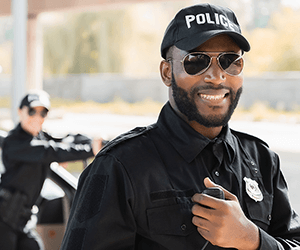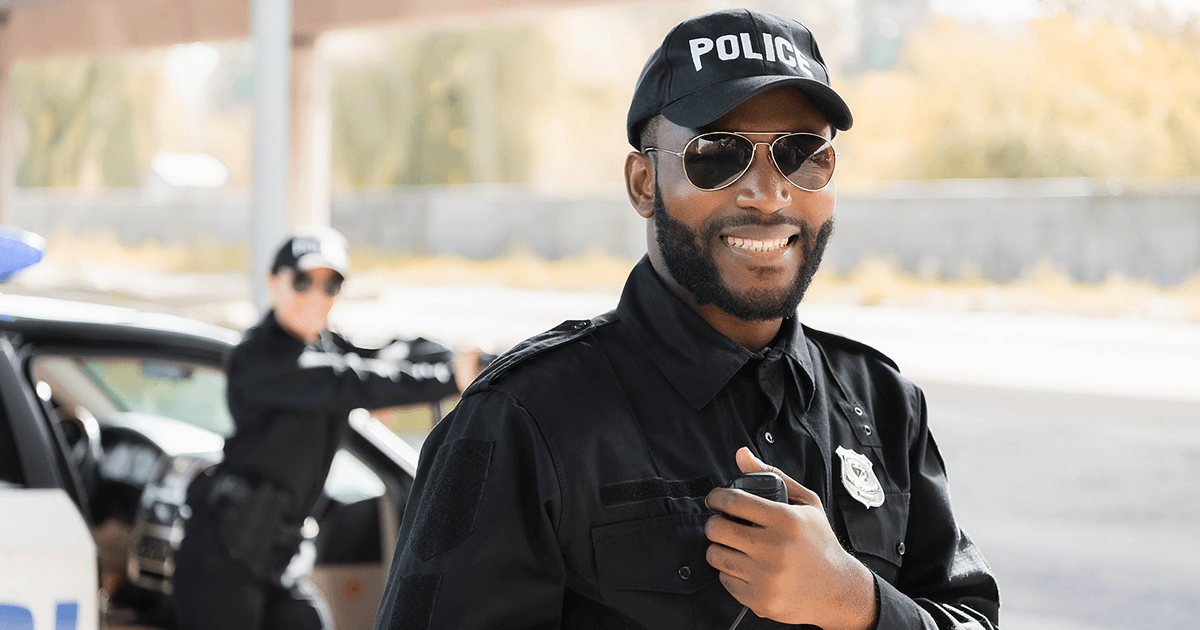Community engagement is at the center of police work.
Police officers make a vow to protect and to serve. In the course of their work, they often put their lives in danger to keep citizens and communities safe. From sheriffs working in small towns to criminal investigators solving crimes in big cities, people with careers in criminal justice go to work to serve and protect our communities. And at the center of their role is community engagement. Here are 25 ways police officers serve their communities:
- Responding to calls for police service
- Maintaining public order
- Enforcing the law and preventing criminal activities
- Investigating crimes
- Protecting victims
- Conducting patrols
- Directing traffic
- Mediating disputes
- Assisting at accidents
- Collecting unused prescription medication
- Ensuring child safety seats are correctly installed
- Speaking to groups about crime prevention
- Performing first aid
- Helping citizens get to safety
- Preventing the destruction of property
- Directing evacuations
- Assisting in emergency situations during adverse weather conditions
- Conducting search and rescue operations
- Collecting evidence at a crime scene
- Testifying in court
- Conducting home checks to make sure homes are safe while owners are on vacation
- Partnering with volunteer Neighborhood Watch or block watch programs to keep neighborhoods safe
- Providing self-defense training
- Keeping schools safe by working as school resource officers
- Performing welfare checks upon request
Police officers also have a role in many innovative and important programs that help them further connect with the communities they serve. Here are just a few:
Shop With a Cop. Numerous communities across the U.S. offer this program (also known as Heroes & Helpers), which pairs police officers with underprivileged youth to shop together for holiday presents for their families with gift cards donated by police and individual, nonprofit, and corporate donors.
Cops and Barbers. This program started in Charlotte, North Carolina, and is now worldwide. It brings cops into neighborhood barber shops to foster open dialogue and positive relationships.1
D.A.R.E. This is a national program, led by police officers in grade school classrooms, that encourages youth to resist peer pressure and live a life free of drugs and violence.2
National Night Out. Police officers connect with communities through fun events like festivals and block parties.
Coffee With a Cop. This program allows community members to get to know their local officers over a cup of coffee.3
PAL. More than 300 Police Athletics/Activities League (PAL) organizations across the U.S. connect cops with youth through sports, academics, and mentoring opportunities.4
The Landlord Education Assistance Program (LEAP). This partnership between police and rental property managers in Davenport, Iowa, aims to help keep drugs and illegal activities out of rental properties.5
Police Explorer programs. Young adults interested in law enforcement careers are brought together with police to learn more about the criminal justice system.6
LAPD Read Along. Members of the Los Angeles Police Department read to children at local libraries through this program.7
Citizen police academies. Participants have the opportunity to meet cops, learn about their roles and responsibilities, and even explore the tools and equipment local officers use.
If you’re interested in making the world a safer place, a career in criminal justice might be right for you. A bachelor’s in criminal justice can start you on the path toward your ideal career. You might also choose to pursue an MS in Criminal Justice or a PhD in Criminal Justice. Most entry-level law enforcement jobs don’t require an advanced criminal justice degree, but those who want to become top criminal justice professionals should consider a master’s or doctorate in criminal justice.
In addition to on-campus learning, online criminal justice degrees are an option. Online learning offers a flexible format that allows students, particularly working adults, to earn a degree on their own schedule. More than 153,000 graduates have done just that and earned a degree online from Walden University.
Walden offers a BS in Criminal Justice, an MS in Criminal Justice, an MS in Criminal Justice Leadership and Executive Management, and a PhD in Criminal Justice. Most of these degree options offer concentrations or specializations, such as Homeland Security, Cybercrime, and Crime and Criminal Investigation, to help prepare you for your ideal career in criminal justice.
Walden University is an accredited institution offering online criminal justice degree programs for graduates and undergraduates. You can earn your degree in a convenient online format that fits your busy life. With a criminology degree, you’ll be prepared to join criminal justice professionals in helping make the world a safer place.
Walden University is an accredited institution offering bachelor’s, master’s, and doctoral degree programs online. Expand your career options and earn your degree in a convenient, flexible format that fits your busy life.
1Source: copsandbarbersworldwide.com/about
2Source: dare.org/about/
3Source: coffeewithacop.com/
4Source: www.nationalpal.org/aboutus
5Source: www.davenportiowa.com/government/departments/police/landlord_education_assistance_program
6Source: https://golawenforcement.com/police-explorer/
7Source: www.urbanlibraries.org/innovations/lapd-read-along
Walden University is accredited by The Higher Learning Commission, www.hlcommission.org.





